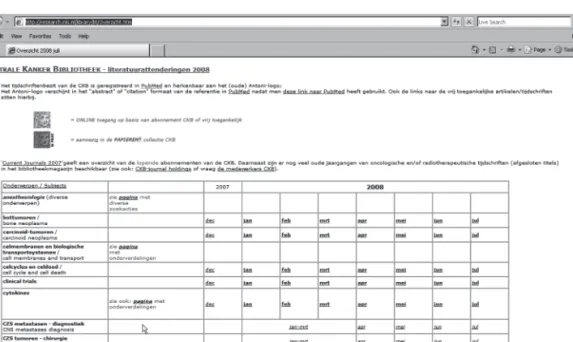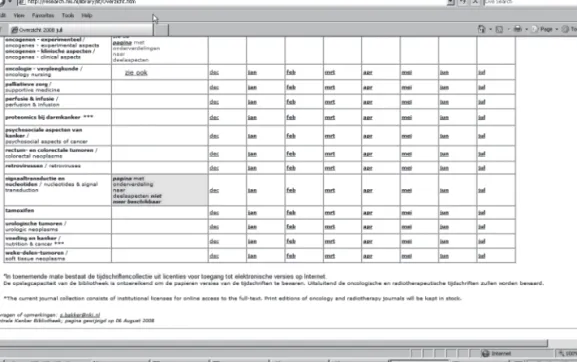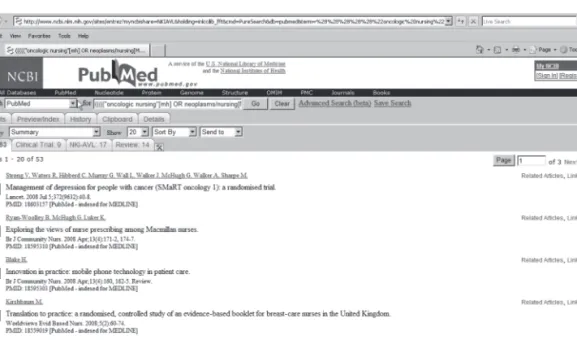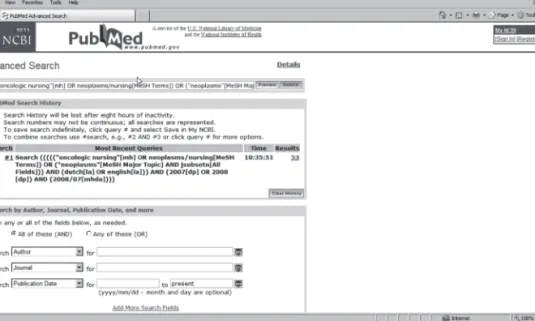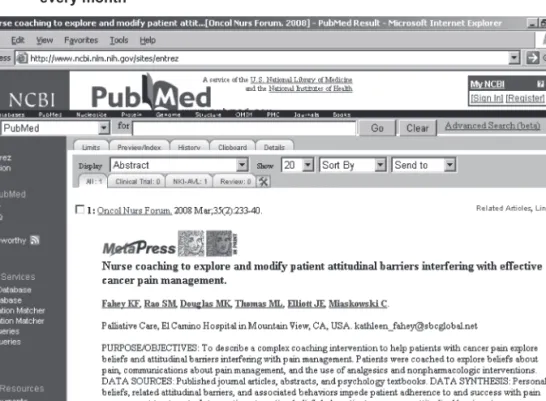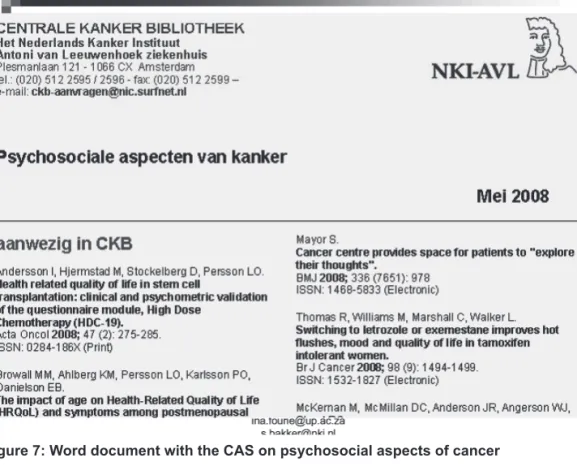In surveys conducted at the annual meetings of the Oncology Nursing Association and the American Society of Clinical Oncology, Cobb and Baird (1999) and Cobb (2003) report good use of the Internet by oncology nurses and an increase in use – although the fact that some respondents reported insufficient computer and Internet skills. For the use of CAS discussed in this article, Internet access and skills in using e-mail and searching the Internet are important. The use of the Internet in oncology nursing has also been explored by Gomez and Clark (2001).
Journals available in the library are registered in PubMed and marked with the (old) Antoni logo that appears in the abstract of the bibliographic reference. The service is based on a number of search strategies that reflect the anticipated needs of user groups. The search strategies used for CAS are available as programmed hyperlinks on the Internet pages of the Central Cancer Library (http://research.nki.nl/library/lit/.overzicht.htm).
The Library's collection also transitioned from print to an increasing number of full-text electronic subscriptions. In South Africa there are eleven official languages of which Zulu (indigenous language) is spoken by the largest percentage of the population. Therefore, we assumed that the interface language and instructions for using the CAS provided by the Central Cancer Library would not be too much of a problem for South African participants.
Verification of interest in CAS (for users of the Central Cancer Library as well as .. South African participants): this may give an indication of whether we need to expand the survey as well as the need to continue/expand the service (the latter especially applies for South African participants).
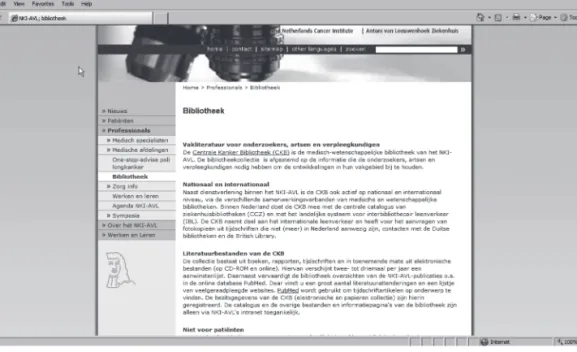
5 Guidelines For Evaluation
In the context of this article, however, we are working on an existing service with the aim of improving it in small steps that are manageable for busy LIS practitioners, and to encourage ongoing evaluation experiments that can lead to a "culture of evaluation". in library and information services.).
6 Preparation For The Exploratory Study
- Selection Of Participants And Their Responses
- Questionnaire For Data Collection
- Analysis And Interpretation Of Data
- Demographic Detail
- Tasks requiring use of CAS
- Actual Use Of CAS
- Access To CAS
- Factors Encouraging The Use Of CAS
- Barriers To Using The CAS
- Satisfaction With Service
- Interpretation Of Data
In the Netherlands, all participants came from the Antoni van Leeuwenhoek and users of the Central Cancer Library. Assumed reasons for the low response are lack of time, the number of public holidays in the Netherlands at the time of the survey (May – June 2008) and the fact that the survey fell within the school holidays. In South Africa it was more difficult to approach participants because we had to rely on the willingness of the oncologists and nurse managers to allow their staff to participate.
Private Medical Oncology Clinic A: (7 responses; the oncologists and many of the .. staff are known to the South African author). Private Medical Oncology Clinic B: (too busy; the lead oncologist for the clinic .. has been contacted by phone with a follow up email explaining the nature of the project. For participants from the Central Cancer Library (Netherlands) who are the real users of the CAS, will focus group interviews will also be used in the future.
For the participants' convenience, the questionnaire was translated into Dutch (for the benefit of participants from the Netherlands) and Afrikaans (for the benefit of participants from South Africa, who could choose from either the Afrikaans or the English version). Respondents could remain anonymous or fill in their name and email address to receive a summary of the survey results. A separate document explaining the rationale for the project and the use of CAS was provided to South African participants.
The question about mother tongue and language skills (i.e. English, Afrikaans and Dutch) was only asked of respondents from South Africa because it was expected that there was a possibility that insufficient English or Dutch skills would hinder their use of the CAS. Difficulties with using the internet by healthcare professionals were also noted by Estabrooks et al 2004 and Cullen 2002. For participants from the Netherlands, lack of time is the main barrier to using CAS, while for participants from South Africa, both lack of time and lack of internet access are the main barriers .
Overall, it appears that participants are quite satisfied with the variety of journals covered by CAS and very satisfied with the ease of use of CAS, timeliness of service, relevance of information obtained, support to access full text, and support in use of the service. The understanding of the use of CAS and the quality of the literature were also rated high. One in six respondents in particular were not satisfied with the ease of use of the service, reliance on full text access and explanations of what the service is about.
Although working with limited data as described in Section 6.3, the exploratory study provided an indication of the tasks associated with CAS, as well as the reasons for CAS, internet access and the barriers to using CAS. Although the feedback provided an indication of the use of the CAS, the feedback on the quality of the CAS needs to be expanded before definitive conclusions can be drawn.

7 Recommendations
The latter is opposed to the fact that the low ratings for information are too difficult or too superficial. It seems that these two options were not clear to the participants and will need to be followed up in focus group interviews. Data on satisfaction with the service will be supplemented with follow-up on the survey.
Indications of tasks and the reasons for using CAS can be explored to refine and expand search strategies. In the South African context, internet access appears to be an important issue to be addressed by the management of oncology nurses' institutions – if they consider the use of CAS important for oncology nurses. In the continuation of the project, theoretical frameworks related to library and information services will also be examined in more detail, for example as explained in Taylor's work on value-added services, Kuhlthau's (2004) on the search for meaning in information search and Hanson ( 2008) on research in digital library services.
Due to the easy set-up of an electronic questionnaire and the value of information from the survey, it will be extended to other user groups of the Central Cancer Library. As it is important to keep the questionnaire short, further surveys will be used to collect data on the actual use of information, archiving of information and the use of other CAS (e.g. discussion lists, blogs, RSS feeds and table of contents services [ TOCs) ]). Participants will be informed of changes made to CAS and the impact of their input.
It is considered important to maintain the goodwill of users and to assure them of the value of their input. For the South African context, participants were informed via their managers that they could access the CAS via the library website and monitor the topic(s) of their interest on a monthly basis. Although the questionnaires provided useful information, it is recommended that a combination of questionnaires, interviews and focus group interviews be used for further data collection.
8 Conclusion
Biomedical information @ the speed of light: implementing desktop access to publisher resources at the Paterson Institute for Cancer Research. Quantitative evaluation of selective dissemination of information (SDI) service: National Center for Scientific Information (NCSI) study, Bangalore.
Appendix A
For which of your tasks you need to stay informed with the latest information published in professional journals. More than 5 years Where you have access to the Internet and current awareness service. Lack of time Not understanding the value of the service (eg its connection to daily tasks).
Lack of computer skills Lack of skills in using the Internet Lack of skills in using cur-.
